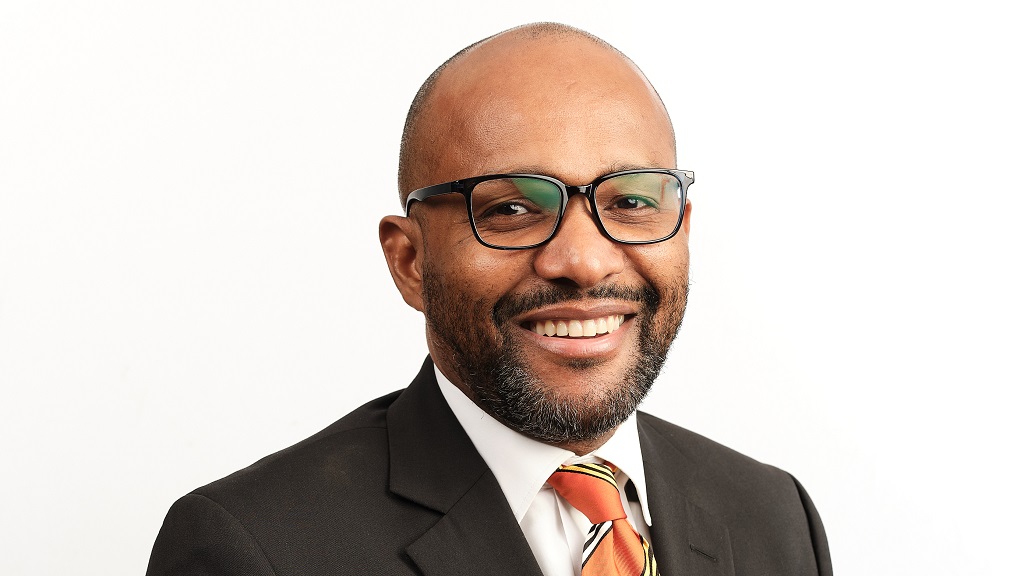Rezworth Burchenson Chief Executive Officer of Victoria Mutual Investments Limited (VMIL) needed to move quickly. The net profit recorded during the September 2022 quarter contributed to the 1.77% or JA$54.09 million growth in retained earnings. However, this was not sufficient to offset the $1.64 billion deterioration in investment revaluation reserve, which resulted in a 34.04% or JA$1.55 billion decline in total shareholders’ equity.
Rezworth Burchenson and Kevin G Richards Chief Executive Officer Kingston Properties Limited separately released two significant announcements over the last two weeks. Separately the two announcements may seem unrelated or even connected, but Businessuite has however found interesting links between them.

Kevin G Richards Chief Executive Officer Kingston Properties Limited
Based on these links we were forced to ask the following questions: Is Victoria Mutual Investments Making A Strategic Move To Acquire Kingston Properties and Does Victoria Mutual Investments Already Have Effective Control of Kingston Properties.?
The most recent came on January 3, 2023 from Richards advising the JSE, the RMOD and the wider investing public that a total of 66,673 units of KPREIT shares were purchased under a current share buy-back programme on December 29, 2022, at an average price of $7.04 per share.
The transaction was executed through their broker VM Wealth Management Limited, which is a subsidiary of Victoria Mutual Investments Limited (VMIL), itself a part of the Victoria Mutual Group.
The other release was made on December 30, 2022 by Rezworth Burchenson
announcing that his company Victoria Mutual Investments Limited (VMIL) had acquired 135,483,871 units of Kingston Properties (KPREIT) shares for a combined consideration of JA$1,050,000,000.
This transaction increased VMIL’s stake in KPREIT to a total of twenty-three per cent (23%), up from 7% as reported in September 2022, making KPREIT an associate company of VMIL.
It should also be noted that based on Kingston Properties September 2022 Shareholding Report:
• VMWealth Property Fund exercised control over 257,885,079 shares in Kingston Properties amounting to 29% of the shareholdings.
• Prime Asset Management JPS Employees Superannuation Fund exercised control over 138,584,772 amounting to 16% of the shareholdings.
Prime Asset Management, was formed in 1996, as a division of Prime Life Assurance Company Limited and was subsequently taken over and renamed VM Pensions Management Limited (VMPM).
Based on the above, as at the September 2022 reporting, Victoria Mutual was able to effectively leverage a total of 52.3% of the shareholding of Kingston Properties.
Prime Asset Management JPS Employees Superannuation Fund and VMWealth Property Fund held the two largest blocks of shares in Kingston Properties, and so it could be argued that Victoria Mutual Investments acquired its increased position from either of those two. Our investigation revealed that the acquisition came from the VMWealth Property Fund.
So, we were able to answer one of the two questions: Yes, Victoria Mutual Investments already has a greater that 50% effective control of Kingston Properties.
This first move by Burchenson and VMIL is essentially to directly account for the share of profits on its balance sheet, effectively shoring it up. Burchenson also expects to benefit from dividend income.
“With the acquisition of the additional shares, VMIL’s 23% stake in KPREIT will result in the Company reporting a share of profit.”
Previously as part of the VMWealth Property Fund they could not do this.
Why Kingston Properties?

Market correcting actions by the Bank of Jamaica (BOJ) coupled with investor sentiment in the US declining further in Q3 2022, this as prices and interest rates rose, where all impacting on the performance of VMIL.
In his Consolidated Financial Statements for the Third Quarter ended September 30, 2022 Burchenson noted that the Bank of Jamaica (BOJ) added a total of 100 basis points to the overnight rate during Q3 2022, via two 50-basis point rate hikes that brought the rate to 6.50% as at the end of the quarter. As the interest rate increased, the yields on Treasury notes fluctuated and the money market remained liquid for short-term placements.
For Burchenson “The third quarter of 2022 was turbulent, as we saw interest rates reaching an 11-year peak, as the central bank sought to put a lid on domestic inflation. As rates across the market soared, the performance of bonds and the fixed income markets deteriorated significantly, in conjunction with the negative impact of higher inflation on the equities market.
As a result, our Gains from Investment activities experienced a 23.77% decline over the quarter, while interest expenses grew 48.22% to $285.47 million.
These market conditions were the main impetus to the 75.82% decline in net profit for the third quarter. We ended Q3 2022 with a net profit of $84.08 million, which was primarily due to net fees and commissions of $227.67 million.
Our net fees and commissions increased 7.15% year-to-date as at September 30 or by $52.20 million, as we sought to increase our capital markets and brokerage activities.”
Burchenson also reported other corrective measures as total assets of $27.57 billion as at September 30, 2022 represented a decline of 9.31% or $2.83 billion over September 30, 2021.
“We continued to de-risk the on-balance sheet assets of our wholly-owned subsidiary VM Wealth Management, to safeguard against the sporadic changes in the bond and equity markets.
More resources were shifted towards strengthening and expanding our Corporate Lending Solutions and Margin Loan business lines. In light of this, cash and cash equivalents, resale agreements and investment securities declined 78.82%, 73.31% and 11.03%, respectively, year-over-year, while our loans receivable grew by 67.07% or $1.75 billion.
Conversely, the recent purchase of a commercial property boosted our property, plant and equipment by $713.38 million or 420.61% year-over-year.”
At the end of the third quarter of 2022, VMIL’s total liabilities declined by 4.95% or $1.28 billion, owing predominantly to the reductions in repurchase agreements, lease liabilities, income tax payable and employee benefit obligations.
In particular, Burchenson noted that “the 16.46% or $3.18 billion decrease in repurchase agreements was part of our de-risking strategy. The net profit recorded during the quarter contributed to the 1.77% or $54.09 million growth in retained earnings. However, this was not sufficient to offset the $1.64 billion deterioration in investment revaluation reserve, which resulted in a 34.04% or $1.55 billion decline in total shareholders’ equity.”
Burchenson we suspect saw Kingston Properties as a low hanging fruit that could be easily picked, and create an immediate positive impact on the balance sheet of VMIL.

Leverage Their Collective Real Estate Competence
Victoria Mutual full acquisition of Kingston Properties or a shareholding move to exercise more control over the company would be consistent and in line with the VM Groups vision.
VM Group wants to leverage the collective Real Estate competence embedded within the Group. The acquisition would also be in line with VMIL’s thrust to expand its real estate investments. The addition of KPREIT to the VMIL portfolio adds significant strength to its balance sheet and enhances its business development capacity.
VMIL will have an opportunity to diversify its real estate investments outside of Jamaica, based on KPREIT’s expansive portfolio in other Caribbean jurisdictions and North America.
Brian Frazer joins the VM Group

Brian Frazer Deputy CEO at VMIL and VMWM
Rezworth Burchenson is already a board member of Kingston Properties, and could push to get Brian Frazer to join him on the Kingston Properties board so as to increase participation in the strategic direction of KPREIT, going forward.
Brian Frazer joined the VM Group in September 2022 as the Deputy CEO at VMIL and VMWM, working closely with Burchenson.
Brian joined the team with over 20 years of experience in the financial services industry and has vast experience in Trading, Treasury, Asset Management,
Risk Management, Compliance, Corporate Governance, Operations, and Product Development.
Brian is expected to further foster VMIL’s growth and contribute to providing oversight to VMIL’s operations as well as all aspects of the fiduciary, financial and operating performance.
Skin In The Game
Burchenson we suspect is hoping that these strategic moves will be sufficient to offset the deterioration in investment revaluation reserve, and restore the billion decline in total shareholders’ equity at Victoria Mutual Investments.
For Rezworth Burchenson this is also personal as he has ‘skin in the game’ with a personal stake of 421,146 Kingston Properties shares and 6,400,330 in Victoria Mutual Investments.
Kevin Richards is listed as a senior manager and not a director at Kingston Properties, and he has more ‘skin in the game’ with 2,000,035 units.
In relation to the other question, Is Victoria Mutual Investments Making A Strategic Move To Acquire Kingston Properties?
We conclude that the answer for now is No. The holdings and arrangement as of January 2023 is exactly where Burchenson and VMIL wants to be. We suspect however that over time VMIL will increase its holdings and make Kingston Properties a full subsidiary.
To be updated
Businessuite 2022 Top 100 Caribbean Companies – US$ Profit After Tax
The 2023 Businessuite Skin Index (BSI)


 Businessuite Markets3 weeks ago
Businessuite Markets3 weeks ago
 Businessuite News241 week ago
Businessuite News241 week ago
 Leadership Conversations4 weeks ago
Leadership Conversations4 weeks ago
 Corporate Feature1 week ago
Corporate Feature1 week ago
 Businessuite News242 days ago
Businessuite News242 days ago
 Businessuite Women2 weeks ago
Businessuite Women2 weeks ago
 Businessuite News24 International1 week ago
Businessuite News24 International1 week ago
 Business Insights3 weeks ago
Business Insights3 weeks ago


















 FosRich is primarily a distributor of electrical, lighting, and solar energy products. FosRich aims to differentiate itself from its competitors in the Jamaican marketplace by providing a quality and cost effective service, and by collaborating with clients on technical solutions. FosRich partners with large global brands seeking local distribution such as Huawei, Philips Lighting, Victron Energy, Siemens, NEXANS and General Electric. FosRich has a staff complement of two hundred and forty (240) people across ten (10) locations in Kingston, Clarendon, Mandeville, and Montego Bay. FosRich also has a team of energy and electrical engineers who offer technical advice and install solar energy systems, solar water heaters and electrical panel boards.
FosRich is primarily a distributor of electrical, lighting, and solar energy products. FosRich aims to differentiate itself from its competitors in the Jamaican marketplace by providing a quality and cost effective service, and by collaborating with clients on technical solutions. FosRich partners with large global brands seeking local distribution such as Huawei, Philips Lighting, Victron Energy, Siemens, NEXANS and General Electric. FosRich has a staff complement of two hundred and forty (240) people across ten (10) locations in Kingston, Clarendon, Mandeville, and Montego Bay. FosRich also has a team of energy and electrical engineers who offer technical advice and install solar energy systems, solar water heaters and electrical panel boards.

 Key Financial Highlights
Key Financial Highlights

 For the three months ended March 31, 2025, the Group generated revenue of $29.97 million, which remained relatively flat compared to the $30.01 million earned in Q1 2024. This consistency aligns with the Group’s strategic shift toward more predictable recurring revenue streams. Notably, the team has continued to invest heavily in Amigo, a new initiative designed to drive scalable recurring income through a modernized business model.
For the three months ended March 31, 2025, the Group generated revenue of $29.97 million, which remained relatively flat compared to the $30.01 million earned in Q1 2024. This consistency aligns with the Group’s strategic shift toward more predictable recurring revenue streams. Notably, the team has continued to invest heavily in Amigo, a new initiative designed to drive scalable recurring income through a modernized business model.




